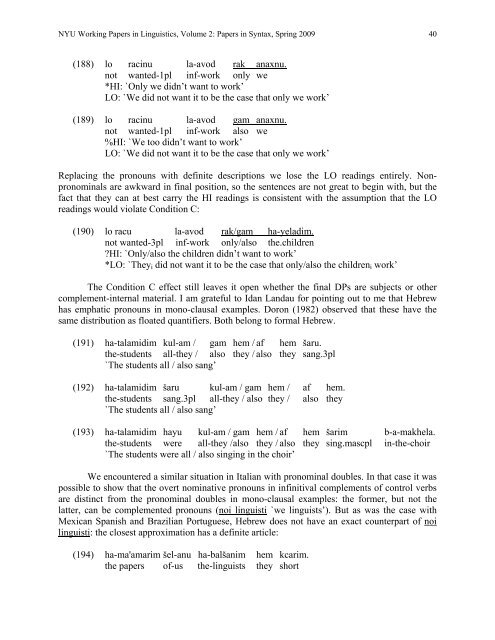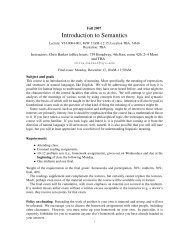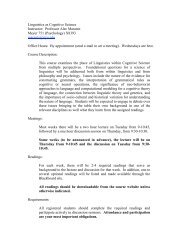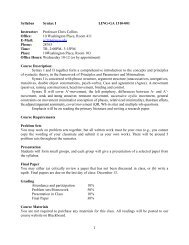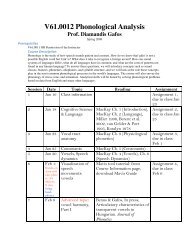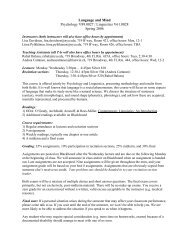Overt Nominative Subjects in Infinitival Complements Cross - NYU ...
Overt Nominative Subjects in Infinitival Complements Cross - NYU ...
Overt Nominative Subjects in Infinitival Complements Cross - NYU ...
Create successful ePaper yourself
Turn your PDF publications into a flip-book with our unique Google optimized e-Paper software.
<strong>NYU</strong> Work<strong>in</strong>g Papers <strong>in</strong> L<strong>in</strong>guistics, Volume 2: Papers <strong>in</strong> Syntax, Spr<strong>in</strong>g 2009 40(188) lo rac<strong>in</strong>u la-avod rak anaxnu.not wanted-1pl <strong>in</strong>f-work only we*HI: `Only we didn’t want to work’LO: `We did not want it to be the case that only we work’(189) lo rac<strong>in</strong>u la-avod gam anaxnu.not wanted-1pl <strong>in</strong>f-work also we%HI: `We too didn’t want to work’LO: `We did not want it to be the case that only we work’Replac<strong>in</strong>g the pronouns with def<strong>in</strong>ite descriptions we lose the LO read<strong>in</strong>gs entirely. Nonpronom<strong>in</strong>alsare awkward <strong>in</strong> f<strong>in</strong>al position, so the sentences are not great to beg<strong>in</strong> with, but thefact that they can at best carry the HI read<strong>in</strong>gs is consistent with the assumption that the LOread<strong>in</strong>gs would violate Condition C:(190) lo racu la-avod rak/gam ha-yeladim.not wanted-3pl <strong>in</strong>f-work only/also the.children?HI: `Only/also the children didn’t want to work’*LO: `They i did not want it to be the case that only/also the children i work’The Condition C effect still leaves it open whether the f<strong>in</strong>al DPs are subjects or othercomplement-<strong>in</strong>ternal material. I am grateful to Idan Landau for po<strong>in</strong>t<strong>in</strong>g out to me that Hebrewhas emphatic pronouns <strong>in</strong> mono-clausal examples. Doron (1982) observed that these have thesame distribution as floated quantifiers. Both belong to formal Hebrew.(191) ha-talamidim kul-am / gam hem / af hem šaru.the-students all-they / also they / also they sang.3pl`The students all / also sang’(192) ha-talamidim šaru kul-am / gam hem / af hem.the-students sang.3pl all-they / also they / also they`The students all / also sang’(193) ha-talamidim hayu kul-am / gam hem / af hem šarim b-a-makhela.the-students were all-they / also they / also they s<strong>in</strong>g.mascpl <strong>in</strong>-the-choir`The students were all / also s<strong>in</strong>g<strong>in</strong>g <strong>in</strong> the choir’We encountered a similar situation <strong>in</strong> Italian with pronom<strong>in</strong>al doubles. In that case it waspossible to show that the overt nom<strong>in</strong>ative pronouns <strong>in</strong> <strong>in</strong>f<strong>in</strong>itival complements of control verbsare dist<strong>in</strong>ct from the pronom<strong>in</strong>al doubles <strong>in</strong> mono-clausal examples: the former, but not thelatter, can be complemented pronouns (noi l<strong>in</strong>guisti `we l<strong>in</strong>guists’). But as was the case withMexican Spanish and Brazilian Portuguese, Hebrew does not have an exact counterpart of noil<strong>in</strong>guisti: the closest approximation has a def<strong>in</strong>ite article:(194) ha-ma'amarim šel-anu ha-balšanim hem kcarim.the papers of-us the-l<strong>in</strong>guists they short


